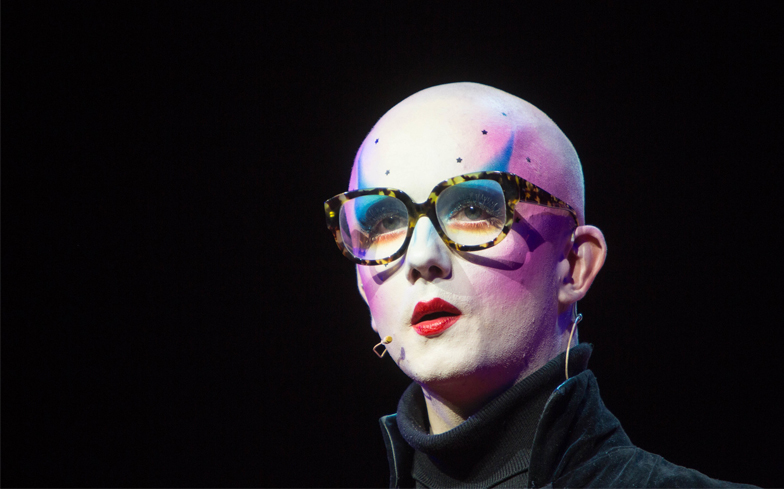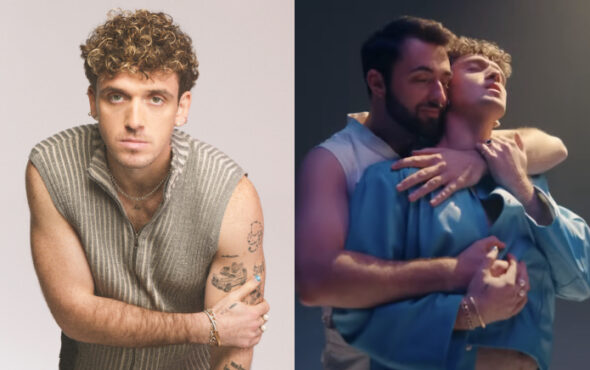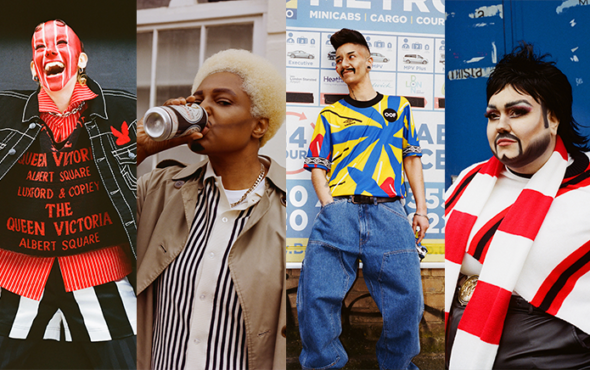
I’ve always struggled with self-celebration. I know, it might sound shocking, but being able to sit down and acclimatise myself with the work that I am doing, and to feel proud of it is something I think I will always struggle with.
Often, because the work isn’t about me, it’s about my community and the many connections and experiences that we create and live through, but also because deep down, as queer people, we are always taught that we aren’t good enough. That we are the underdog, and that we aren’t worthy of success or greatness.
I was asked to meet Ashleigh at 8pm one cold September night, to discuss TED. That’s all I knew. I was baffled at the fact that she wanted to meet for a coffee at 8pm, but I looked past that, not really knowing what was going to happen. It’s rare that we get good news in person nowadays. As a freelancer, and someone who has their fingertips glued to their laptop most of the day, receiving exciting news in person is rare, but as Ashleigh shared with me that the TEDxLondon Women team wanted me to speak at their December event, I didn’t know how to react. In probably the most British way possible, I nodded, and said ‘cheers’, before the deluge of information began.
TED, and its sibling offshoots of TEDx, are an invaluable resource to so many people. A production that is completely volunteer-led, it creates an environment with a passion that is only driven by information and change. The hundreds of volunteers, taking time out of their days to organise monumental scale events is a testament to its power and courage.
I remember sitting down thinking about what I could speak about and was met with a choice. Choice and autonomy within that choice is really important when queer people are asked to tell their stories. It’s a choice that often allows us to move from exploitation, into a space of empowerment. We are able to tell our own stories in a framework that allows us to be the narrator, and the editor, and the truth sayer. We are able to decide whether or not we even want to share those stories. No pressure was ever pushed onto me during the whole editorial process of writing the script, to push more trauma out of my mouth. It was a decision I made, that I was content with. I first wrote a script about the ways in which we should all be able to just ‘live our best lives’ and, in a very Goop, Paltrow manner, ‘just be’. But it didn’t sit right. I couldn’t stand there and share words, that I myself were not living to the letter. So instead of lying, I decided to write about that very fact.
The fact that trans and non-binary people, up and down the country, and across the world, know our own strength, and our validity. We never second guess it willingly, but often fall into traps that mean we sit and think about things we know are certain, for too long. In the first read-through of the script, we met at a hotel in London on a brisk Sunday morning. I’d not met the other speakers yet and was terrified I was going to appear unprepared, or too avant-garde. But this wasn’t a competition. This was a space for womxn to be able to share their own tales of jubilation and hardship, not ‘win’ anything. Not to be better than anyone, or feel like there was an uneasy tension in the room. As I started reading my script, it hit me just how personal the story was. My voice wobbled, and I ended up stopping, only to look up to see Maryam Pasha, TEDxLondon Women Director, and several other speakers shedding a tear. Big Mood.

Maryam was truly a bundle of joy. A nurturing yet focused woman who allowed each speaker to flourish in ways only they know how. Her commitment to diversifying the speakers is really brilliant. I spoke to her recently after the event to see what her feelings were about the day.
“As a curator, I think stories and ideas and issues that Jamie highlights in their talk are essential for us to be amplifying in an environment of mainstream media hostility. Jamie and I were both aware that a talk like this at an event that has the word ‘women’ in the title could definitely raise a few eyebrows, and maybe even attract people who are outwardly hostile … [however] I was delighted by the response of our audience”.
The care and attention that the team take, crafting each speaker into performers, is something I wasn’t expecting at all within the journey. I knew there’d be rehearsals, and time spent ensuring that what we were saying had legs, and a body, but the way in which our expertise was shaped into something that amplified our own words to volumes we didn’t even know was possible, was one of the most pertinent aspects of the experience I will take away. Never was there a time when it felt like we were being critiqued, rather we were being pointed in the right direction. Never negative, always constructive.
The day of the talk was truly one of the most nerve-wracking and suspenseful moments of my life and career. Maryam had just walked on stage to congratulate the previous speaker and introduce me. As this crossover happened, I knew something was afoot. I felt different. My inner space of calm had moved to a place of rapid worry. Without haste, I turned to Ashleigh and stated I needed emergency tissues. I had pondered, since that first read-through, as to whether or not I’d cry again, and before now I felt like I had it all under control. But in those 30 seconds before going on stage, I knew it was going to happen. We took to work shoving multiple man-size kleenex up my sleeves, as I returned to side stage.
There’s nothing wrong with showing emotion, even if it does involve a camera zooming in on your face as you ugly cry in front of near 1000 people. The message I was sharing was one of caged joy. A message to share that we are all capable of feeling joy, and as non-binary and trans people, we know what this joy feels like. But often the key is misplaced or is handed over to people who don’t know anything about how to unpick the lock. That our youth is often full of memories of excitement at exploration of our own self, with adulthood not just meaning we have to take our own bins out, but a heavy, dull weight of worry that we aren’t allowed to be as naive and carefree as we once were. The emotion was necessary for me. It was a release, of not just the feelings I was sharing vocally, but the TEDxLondon Women’s journey. A release.

Seeing the reaction to the talk, now it has been shared online, is something I cherish, whilst realising is still problematic. There have been so many ways people have reacted to the talk that I’ve began making a tally in my mind of the three main ways people are responding. It’s either white mums, telling me how brave I was, and that they loved my shoes, or it was white men, telling me that they didn’t understand what I was saying and that their upbringing and privilege means that they’re incapable of empathy, no matter what that looks like. Great. Then finally there was the reaction I cared most about. From the community. The messages I open and feel with every word, from trans people young and old, telling me they resonated, and felt what I was saying. That’s what I cared about. Being able to use my privilege as a white person to move the conversation away from just validity, but to the persecutory ways in which white supremacy and fascism target black and brown trans people the hardest. Yes, the talk is about highlighting the immediate dangers and targets trans and non-binary people face daily, in the hope cis people step up and become allies for us, but it’s more than that. It’s a battle cry, whilst simultaneously being a hand to hold. The dangers online, and in person, are so real and visceral. “The team and I, along with Jamie, came up with an action plan of how we would deal with harassment and bullying online. Looking at what point we should close various comment channels, or take the talk down altogether if necessary … [the speaker’s] safety is paramount”, echoes Maryam, looking at the response after the talk went live online.
The TEDxLondon Women team became a family, and for someone like myself who enjoys the company of approximately 2.5 people, it was overwhelming to feel such an amount of love and support from people who truly championed what we were all saying. To seamlessly allow trans and gender non-conforming people into the space, without it then being in-accessible. From the language used to the provisions put in place to ensure my safety, it was all done without me having to ask, at all. Just how it should be. A non-issue. There was no financial motive, no motive based on selling a product or pushing a certain message. Just that of allowing speakers from all walks of life, to be able to celebrate themselves, and share a message with the world that people need to hear, and for that, I can’t thank them enough.



